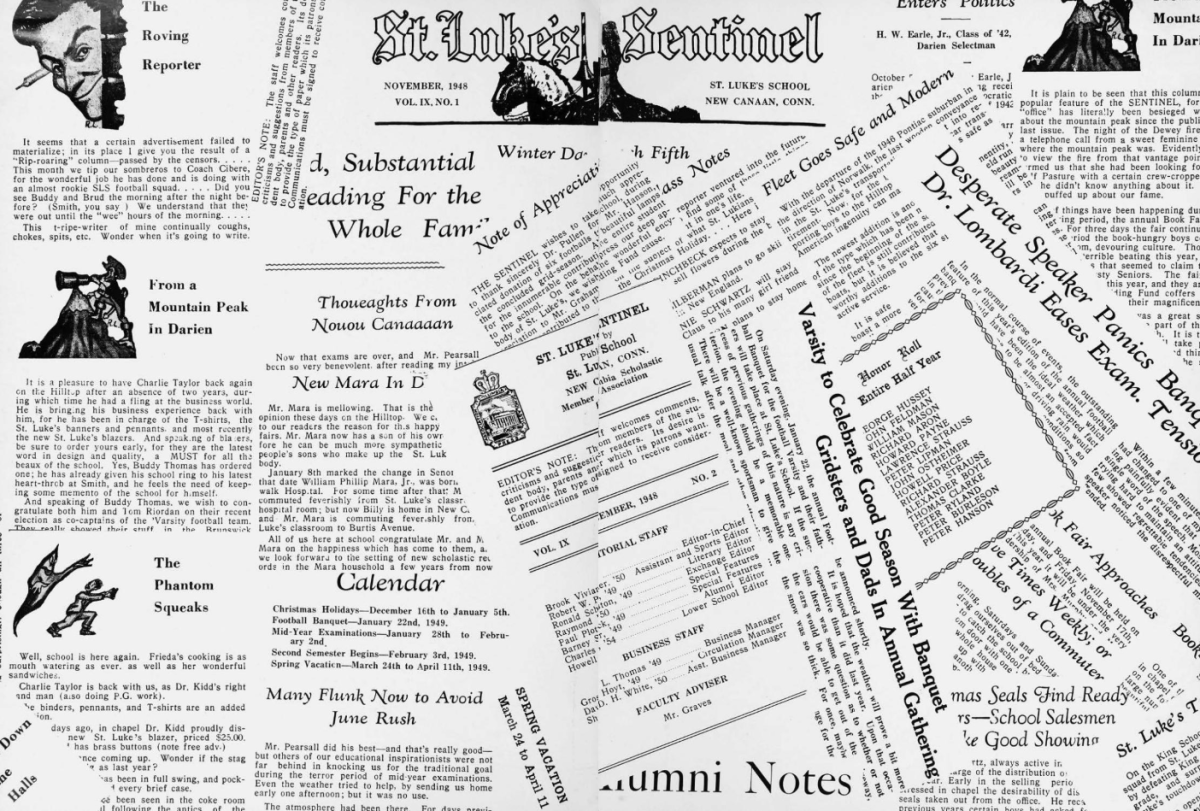A year ago, we interviewed St. Luke’s college counselors, Sonia Bell and Stefanie Veneruso, as well as the Executive Director of Admissions at Middlebury College, Sam Prouty. Our intention was to gather advice from the perspective of people who help to craft applications, and from those who receive and interpret them. Since one of us is now at the end of the college process while the other is beginning, we can reflect on the guidance we have received and its effectiveness.
As early as sophomore year, students at St. Luke’s often feel pressured to begin thinking about college. In our first article in this series, Mrs. Veneruso and Mrs. Bell advised us to avoid focusing on college in the early years of high school.
Calum Regan ‘24: In retrospect, I find this advice very powerful as I was able to use my freshman and sophomore years to discover which classes and topics interested me most. I believe that creating an inaccurate picture of yourself meant to impress admission officers will make the college process more difficult. When visiting schools, you might lack the self-awareness to know which colleges and programs are best for you.
Lucie Geist ‘25: As a junior, I needed my underclassman years to gain a better sense of self before jumping into the college process. If I had not taken the time to get to know myself as a student, friend, and community member, I would not have the confidence or stability now to begin making major decisions about my future. Moreover, I remember Bell’s point that students who are most eager to go off to college are also the first to come back to visit St. Luke’s; I do not want to feel regret for lacking a full high school experience when the college years will happen eventually.
Ms. Veneruso also suggested that we enjoy the process of visiting schools as an opportunity to learn more about ourselves and our preferences.
Regan: I visited schools across the country with different members of my family. It was helpful for me to get different perspectives from different people. Many of the schools I visited were in cities I didn’t know well or had never visited previously. Treating the visit like a tourist adventure took pressure off the event and allowed me to easily form opinions about schools.
Geist: I appreciated this advice and used the mindset when visiting colleges over spring break. I visited 15 schools, a process which could feel overwhelming and monotonous. However, the schools I saw all had varying identities, creating an opportunity to explore new, distinct environments and discover my preferences.
When thinking about touring during your junior year, Mr. Prouty says that it is important to visit lesser-known schools so that we avoid limiting ourselves to colleges with a “better” reputation or name. Mr Prouty explains that there are 4,000 schools in the country, and we should not be focusing only on the 30-40 most popular options.
Regan and Geist: Since we have both gone through the touring process, we agree with Prouty that it is important to visit some schools with less visibility and selectivity. If you identify the specific attributes of a school that you like, it could be helpful to look at a range of popular and lesser-known schools that are similar. However, it is a bit easier said than done to ignore the most popular schools in the nation, especially at a prep school where students face a natural pressure to attend well-known colleges.
When it comes to writing applications, Mr. Prouty advises students to demonstrate their authenticity and avoid spending time twisting themselves into the person they think the colleges want them to be.
Regan: When speaking with other applicants in the fall, I noticed that some people were having trouble describing themselves the way they hoped to be seen by colleges. In reality, it is easier to accept a denial knowing that you were true to yourself. Teacher recommendations and other application components that aren’t consistent with the way you describe yourself can hurt your application.
Geist: I think students can face a lot of pressure to fit a mold that they believe will get them admitted to a certain school – Prouty’s reminder about staying true to oneself is uplifting for this reason. I feel it is often overlooked that students should demonstrate how they differ from the rest of the applicant pool, rather than attempting to fit into it. I think this advice can also ensure that a college admits a student for who they are, not for someone they pretended to be.
Mrs. Bell wishes that people would not value themselves based on the schools they attend. She wants students to see school as a place to grow and learn, not as a marker of their intelligence or worth.
Regan: I wholeheartedly agree. As I end the process, it has become clear that you can succeed at any college or university.
Geist: I agree and think Bell’s advice ties into the idea that college is what you make of it. Students should look for a school that contains the resources that will meet their needs and encourage their success, whatever that may be.








![iStock. (n.d.). Anonymous business partners making handshake in shadow [Photograph].](https://digitalsentinel.org/wp-content/uploads/2025/04/Screenshot-2025-04-16-at-3.42.57 PM.png)







